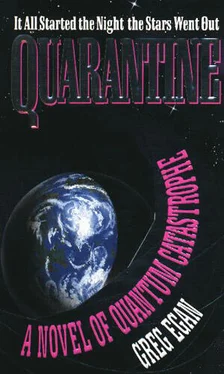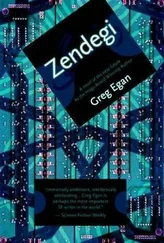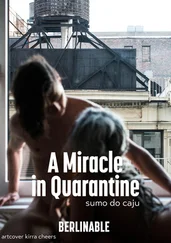There's plenty of slack in the timetable; it's only 01:07, and the van's not due to depart until 01:20. I climb into the back, and sit in the dark. My presence or absence will have no effect on the vehicle's actions; its route and schedule have been pre-programmed, so nobody observing its passage will be observing me — measuring me 'in' or 'out'. However, they will be collapsing the van itself — keeping it on a single, plausible, 'classical' trajectory from here to BDI — and it's comforting to have that restraint imposed. I'm not sure what difference it makes in the end… but it's good to know that the vehicle won't be free to take every possible path across the city. Somehow, the thought of versions of me arriving at the wrong destination entirely seems worse than any other kind of fate.
When the van starts to move, the effects are barely perceptible; the motor is silent, the acceleration gentle. Sitting on the cool metal, smelling the faint odour of plastic from some recent cargo, everything is disconcertingly mundane.
I find myself at a loss to know how to pass the time. I don't want to dwell on the dangers ahead; there's nothing to be gained by contemplating the 'improbability' of success. I can't go into stake-out mode, but I distract myself by concentrating on trying to judge the van's progress — without aid from P5,without even consulting the route marked out on Deja Vu's street map. The ride is smooth, but taking a corner is unmistakable, and I plot each turn-off on a vaguely imagined map, summoned from memory alone. I notice occasional, faint decelerations as the van avoids other traffic — deviations from the predetermined schedule, yes, but still entirely independent of me. I was wrong: outside the van there's no dream city, just the same New Hong Kong as always. And inside?
I can't help myself; I take out the dice generator and run it again. The machine is too smart for its own good; the holograms it creates are always scrupulously consistent with ambient light, and so, in the darkness, the dice are rendered realistically invisible. Another chance to decide not to throw the dice … and risk not being chosen? I use a flashlight to watch the snake's eyes fall — and whatever the logic, the sight is powerfully reassuring. I shut the thing down after witnessing six tosses — having reduced my eigenstate's probability by a factor of about two billion.
The van takes frequent, gentle turns as it moves through the clusters of branching streets towards BDI. I lose track of where I am; the pathological layout here is too complex to recall in detail, unaided. When the van finally halts, I wait thirty seconds, to convince myself that it hasn't merely paused for some unforeseen obstruction. I climb out, and find myself standing almost on the spot where I released Culex, back in January. Memories of the night flood back, with perfect clarity — but the process feels more like voyeurism than nostalgia; I have no right to stare so brazenly into the life of that dead stranger.
It's three minutes past two. I have fifty-seven minutes. I glance up at the grey sky, at The Bubble weighing down on me, oppressive as a blanket of thunderclouds. From nowhere comes an irritable thought: I should have waited for Lui to pay me. Five hundred thousand dollars. And then decided if my commitment to the true Ensemble really demanded this piece of lunacy.
I could crawl back into the van.
I don't, though — and any versions of me who did are as good as dead, and they surely know it. How do they feel about that? How do they rationalize that?
I head for the fence.
I climb over as I did before; the prospect of unnecessary miracles on open ground makes me uneasy — and my smeared self, as always, complies with my expectations. Or vice versa.
I have no idea who's on duty tonight, but I picture Huang Qing and Lee Soh-lung. Preferably playing cards, not bothering to glance at the monitors. I still don't know at what point I sabotage this kind of observation: in the camera's sensor chip, the cable, the display — or the retina, or brain, of the watcher. Whatever gets me by unnoticed; all I can choose is the outcome, and who knows what mechanism is most likely?
I enter by the same window, but this time there's no need to cut; it slides open at my touch. I climb through, and make my way slowly across the lab, hands outstretched, wishing I still had the wireframe map that guided me the last time. I bump into a stool, then a bench, but I don't send any glassware crashing. Those of me who did might as well slit their wrists on the fragments. I move down the hallway, and into the stairwell. The vault, according to Li Siu-wai, is on the fourth floor, in the back of Chen Ya-ping's office; in fact, even after all this time, I think I can recall a blue no data region in the Culex map in just that spot.
Half-way up the stairs, doubt hits me like a blow to the chest. Po-kwai is twenty kilometres away. Fast asleep. We're not 'linked', we're not 'smeared', she's not helping me 'choose reality'. How could I have ever swallowed all that quantum-mystical voodoo? It's bullshit. Lui set me up; it's as simple as that. The Canon is a trick, to test my loyalty. He sabotaged my mods. Planted a rigged dice generator in a stall near my home. Conspired with Po-kwai, and the guards here, and at ASR.
And the padlock? How could he have known that I'd try something as ridiculous as 9999999999, first time?
But if he's screwed around with my mods, there's no telling what else he's done inside my skull. For all I know, Hypernova might grant him absolute control over everything I do, everything I think. He could have made me guess the right combination.
I lean against the wall, trying to decide which is the most insane: believing in this pointless, farcical, massively implausible conspiracy… or seriously thinking that I can open locks by splitting into ten billion people.
I stare down into the darkness of the stairwell. And the true Ensemble? The mystery I'm living for? Is that nothing but another lie? I know it's nothing but the loyalty mod, the way my brain's been wired, but —
I search my pockets for something coin-like, something Lui can't possibly have interfered with. The best I can do is the flashlight's spare button-shaped power cell; there's a plus sign engraved on one side and a minus sign on the other. I crouch on the landing, the flashlight beam making a wedge of brightness on the concrete.
'Five plus signs,' I whisper. 'That's all.' The odds are one in thirty-two; not much of a miracle to ask for.
Plus. Plus.
I laugh. What did I expect? The true Ensemble would never abandon me. Minus.
A strange numbness spreads through me, but I toss the cell again, quickly — as if what follows might somehow undo the past, if only I act swiftly enough.
Plus.
Minus.
I stare at the final verdict — and realize that it proves nothing. Everything I've been living for might still be either true or false.
Either way, though, there's no point going on.
I bound up the last two flights of stairs, jubilant, invulnerable. If those five simple plus signs haven't purged me of every last trace of doubt and paranoia, then nothing will.
Once I'm in Chen's office, I switch on the flashlight — unsure why I didn't 'risk' using it when crossing the lab on the ground floor, but confident now that there is no danger. I could turn on every light in the building and scream at the top of my voice, and nobody would know I was here.
What looks like a normal connecting door leads to a small room fronting the vault itself: an unimposing construction of dull grey polymer composite — harder to cut, abrade, melt or burn than a metre or two of solid steel, but about a thousand times lighter. The control panel has a thumb-scanning window, a numeric keypad, and three slots for keys. I hesitate, half expecting to have to wait a while for the lock to smear sufficiently, but a green light on the panel shines almost at once. Of course — the thing has been smeared since long before I walked in; every unobserved inanimate object does so. All I've done is observed it without collapsing it — and hence smeared myself still further into different versions, a whole new lineage for each eigenstate of the lock, giving me the power to choose its state when I choose my own.
Читать дальше










